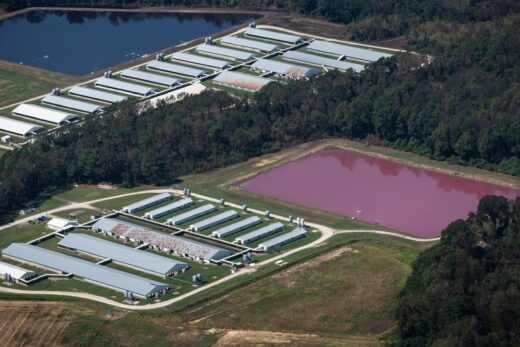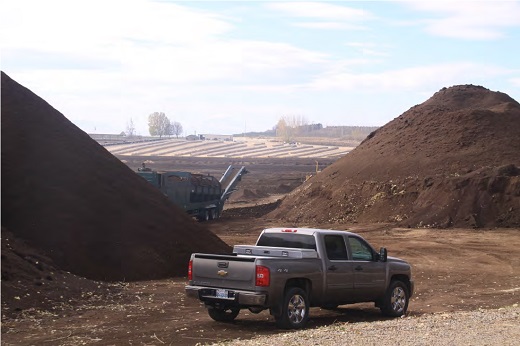
Big Ag Needs Governments to Keep Bailing It Out
By Amal Bouhabib
Senior Staff Attorney
Our rights to enjoy clean water, fresh air and land free of life-threatening toxins should be non-negotiable. But when it comes to Big Ag, our elected officials are consistently willing to give those rights away.
In June 2024, Oklahoma passed a law shielding poultry giants like Tyson, Cargill, and Smithfield from lawsuits over pollution caused by the waste they produce. “You’re immune,” Oklahoma Governor Kevin Stitt said in signing the measure, adding that Oklahoma would not allow “frivolous” lawsuits to put poultry factories out of business.
Presumably the “frivolous” lawsuit Stitt had in mind was State of Oklahoma ex rel. Drummond v. Tyson et al., a nearly two decades-long federal lawsuit filed by the state that accused 11 poultry companies of polluting the Illinois River watershed with chicken litter (waste including feces and urine). The state claimed that the pollution was killing fish and increasing filtration costs for the more than one dozen towns that relied on the watershed for drinking water. In February 2023, a federal court agreed. Hailed as a harbinger for “cleaner water and protection of natural resources in Oklahoma,” the outcome took 18 years, a 148-day trial and a failed mediation for the judge to find the poultry companies liable. It took only 18 months for the Oklahoma legislature to make sure Oklahomans could not do it again.
Sadly, cases like this – where the government overturns hard-fought progress against Big Ag and in favor of a fairer food system for all– are the norm, not the exception. Driven by the myth of agricultural exceptionalism or by business justifications aided by massive lobbying efforts from the agribusiness sector, state and federal government bodies come to the rescue of Big Ag time and again, at the expense of the people and communities they claim to serve.
Take Missouri, where, in 2010, residents living near a Smithfield hog concentrated animal feeding operation won an $11 million verdict against the company for creating an odor nuisance that was “intense enough to prevent them from venturing outdoors on many days.” The following year, the Missouri legislature passed a law that banned nuisance claims against CAFOs based on odor, noise, human health, and environmental quality.
Or Wisconsin: where in 2021, residents of Kewaunee County won an 8-yearlong battle to forestall the expansion of a CAFO that threatened to further contaminate their water supply. Less than three years later, the Wisconsin legislature has proposed a law that would restrict local authorities, like Kewaunee County, to regulate Wisconsin farms and other animal facilities.
Examples can be found all over the country. In Washington state, just after FarmSTAND successfully represented residents of Yakima Valley in a federal lawsuit against dairies whose manure runoff had contaminated local drinking water, a Representative from Washington tried to get a federal law passed that would eliminate regulation of manure amendment to federal law that would prevent manure from being subject to regulation; and in North Carolina, the state legislature fast-tracked a bill that effectively foreclosed lawsuits against agricultural operations including CAFOs, in response to an increase in odor nuisance lawsuits in the state.
Despite all these examples of our elected representatives rolling over to Big Ag, not all of them are. By contrast, state governments including those of Colorado and New York are helping to bring about a safer and healthier food system by guaranteeing essential services like doctors, teachers, clergy members, community aid workers, and attorneys to agricultural workers.
Of course, industry considers this intolerable, and has taken to the courts to stop positive government action. FarmSTAND is currently defending Colorado’s law from a legal challenge by a Big Ag group.
The common refrain in defense of Big Ag’s exceptional treatment is that, simply, it’s food. We need it – and Big Ag makes it seemingly affordable. But this belies the decades of consolidation and billions in annual taxpayer money that goes into making the agribusiness sector – giant corporations and the industry associations that represent them – rich.
Aided by a “revolving door” between government and the agribusiness industry (two-thirds of meat industry lobbyists are former government employees), the agribusiness sector spends more each year in federal lobbying than the oil and gas industry and defense sector.
It then steers federal, state and local farm policy for its own profit, often in the form of continued and expanded taxpayer subsidies. The lion’s share of these subsidies goes not to small farmers, but to large CAFOs that rely on the subsidies to maximize production above all else – leading to increasingly large agricultural operations that crowd out small or midsize farms, worsening pollution, overproduction, and market distortion.
The ubiquitous regulatory and statutory exemptions for Big Ag make lawsuits a last, and sometimes only resort. And lest there be any doubt, the lawsuits being brought are far from “frivolous.” CAFOs produce a massive amount of manure, sometimes amounting to “more raw waste than the human population of a large U.S. city.” With more manure than can be used as fertilizer, the feces is dumped into football-field sized “lagoons” where it produces and releases deadly gases linked to a host of diseases in people exposed to them. Waste lagoons are prone to leaks and spills, which can lead to dangerous ground and water contamination. Fertilizer manure is just as hazardous: some states, like North Carolina, allow it to be applied through a spray field system, where it is sprayed directly into the air, causing a smell “like a body that’s been decomposed for a month.”
Along with causing rampant pollution and serious health issues like asthma, blue-baby syndrome (where the baby cannot get the oxygen it needs), and chronic bronchitis, CAFO waste can lead to “life-altering” disruptions. In the Missouri case, the jury was shown slides of hog manure lagoons operated by a Smithfield subsidiary, one with a 5-inch crust of flies feasting on it. These so-called “filth flies” contaminate anything they come into contact with. Residents who lived near the CAFO also complained of a stench so overwhelming that they would “retch and run indoors.” A plaintiff in a case against a North Carolina CAFO said that the fumes from the lagoon and spray field system made it hard to breathe and led to “asthma, chronic skin disorders, sinus problems, depression and a suite of other health issues.”
Adding insult to injury, communities that are most harmed by Big Ag end up paying the costs.
In addition to direct costs in the form of billions of dollars of subsidies to Big Ag per year, funded by taxpayers, Big Ag benefits from tax exemptions and abatements that reduce revenue to the state and county while putting extra strain on local resources. Then there are costs associated with air pollution, water pollution, animal mistreatment and cruelty, increased illness and antibiotic resistance, resource depletion, and worker exploitation, not to mention reduced enjoyment of property and the degradation of qualify of life for those who live nearby.
And while government proponents of protecting Big Ag do so under the guise of saving animal agricultural producers the costs of defending “frivolous” suits, this doesn’t account for time and money states spend defending or prosecuting worthy cases, like the one FarmSTAND and its partners recently won in North Carolina. There, the North Carolina legislature passed an unconstitutional law that restricted organizations and journalists from conducting and publicizing undercover investigations in privately owned CAFOs and slaughterhouses, and then chose to defend the case all the way up to the U.S. Supreme Court, costing taxpayers almost a million dollars in attorney’s fees.
Laws like this are all too common, but that doesn’t mean the fight is over. Advocates and impacted communities alike remain committed to reining in Big Ag’s hold on government. At FarmSTAND, we’re ready to keep fighting alongside communities to ensure their rights to a fairer, cleaner, safer world.


